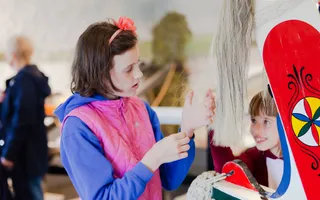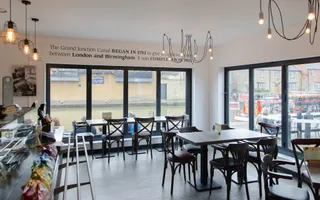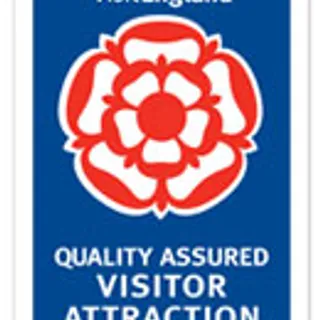The Canal Museum, the first of its kind in the country, is located in the pretty canal village of Stoke Bruerne along the Grand Union Canal. A historic Grade II listed corn mill, it offers three floors of rich waterway heritage and panoramic views.
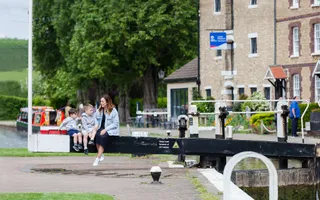

The Canal Museum, Stoke Bruerne
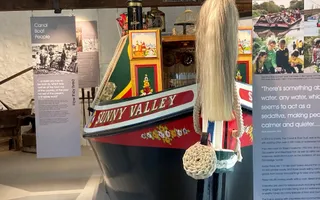
Planning your visit
The Canal Museum has irregular hours, please check opening hours before visiting to avoid disappointment. You can also check our Facebook page.
Address
The Canal Museum, Stoke Bruerne, Bridge Road, Stoke Bruerne, Towcester, NN12 7SE. View on Google Maps
What3Words: ///bulk.quiet.challenge
Opening times & prices
It's free to visit the museum! Just be aware that if you're driving in, then parking charges apply.
Winter opening hours (from Saturday 1 November 2025): Tuesday - Friday, 10am - 3pm; Saturday, 10am - 4pm
Parking
Mon - Sun (4 hours £3), (all day £5); Evening/early morning £1. There are two disabled bays in the main car park.
Access
There is level access from the car park to the canal towpath, and toilet facilities, plus ramped access to the museum café and shop. Wheelchairs will not be able to access the 2nd floor. The towpath is in good condition between the museum and Blisworth Tunnel entrance.
Getting here
If you're travelling by car, follow the signs from the A508. The museum's car park is accessed via Chapel Lane. For Sat Navs, please use NN12 7SQ.
There are two accessible parking spaces. If you're cycling there is a dedicated bike park.
Contact us
Phone: 01604 346096 Email: [email protected]
Follow us: Facebook: @thecanalmuseum Instagram: @canalmuseum1
Things to see and do
Immerse yourselves in the treasure trove that is our museum, full of interactive displays and collections to bring to life what it was like to live and work on Britain's canals. Take a stroll along the towpath near Blisworth Tunnel, and the Woodland Walk, with its wire sculptures.
Enjoy watching the wildlife, do some pond dipping, and see colourful narrowboats. With two pubs and places to stop and grab a coffee, Stoke Bruerne is an ideal spot to spend a few hours.
Inside the museum
Immerse yourself in the sights, smells and sounds of life on the canals in former times, dress up in boaters’ costumes and have a go at creating your own roses and castles, the iconic decoration only seen on the English canals.
Visit the museum's narrowboat ‘Sculptor’, moored up outside. Built in 1935 for the Grand Union Canal Carrying Company, Sculptor started life carrying general cargo, such as cotton, wheat and coal. During World War 2, she was in action in London as a fireboat, putting out fires. Before she retired in 1984, Sculptor was still in use as a maintenance boat.
Outside the museum
The museum is set in the picturesque village of Stoke Bruerne, containing a flight of locks, a blacksmith’s forge, and the 200-year-old southern portal of the almost two-mile-long Blisworth Canal Tunnel. Can you spot the site and entrance into a filled-in boat dock, the stables where the boat horses used to rest and, the hut where the leggers used to wait to walk or ‘leg’ the boats through the tunnel?
A short walk down the lock flight will take you to a nature reserve which once contained brickworks and, where there was once an old dock for boats to load the bricks used to build the canal and tunnel. A bit further on is a dipping platform.
While you are here, why not hop on one of the two passenger boats for a trip into the mouth of the tunnel and back?
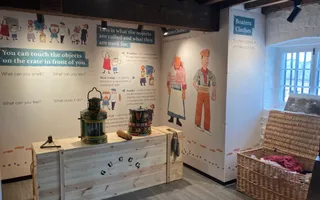
Designated museum collection
Designated for its national importance by Arts Council England. Most of our museum collection is housed within the National Waterway Museums at Ellesmere Port and Gloucester Docks. However, you can also find important, treasured items here at the Canal Museum as well as at the [Anderton Boat Lift Visitor Centre]https://canalrivertrust.org.uk/things-to-do/museums-and-attractions/anderton-boat-lift-and-visitor-centre-cheshire) and Standedge Tunnel.
The collection forms the most comprehensive collection of artefacts that tell the story of Britain’s canals and navigable rivers over the last 300 hundred years. The collection consists of over 12,000 objects – including 68 historic boats and the national waterways archive.
Where does the water come from?
The water in the Grand Union Canal at Stoke Bruerne has two main sources. From the north {upstream) water is mainly supplied by Drayton and Daventry Reservoirs on the Braunston Summit, From the south (downstream) water is pumped up from the River Tove and the River Great Ouse. Pumping from the rivers is strictly controlled to maintain river ecology. Pumping uses electricity and is expensive so using reservoir water is prioritised.


Stay connected
Sign up to our newsletter and discover how we protect canals and help nature thrive


